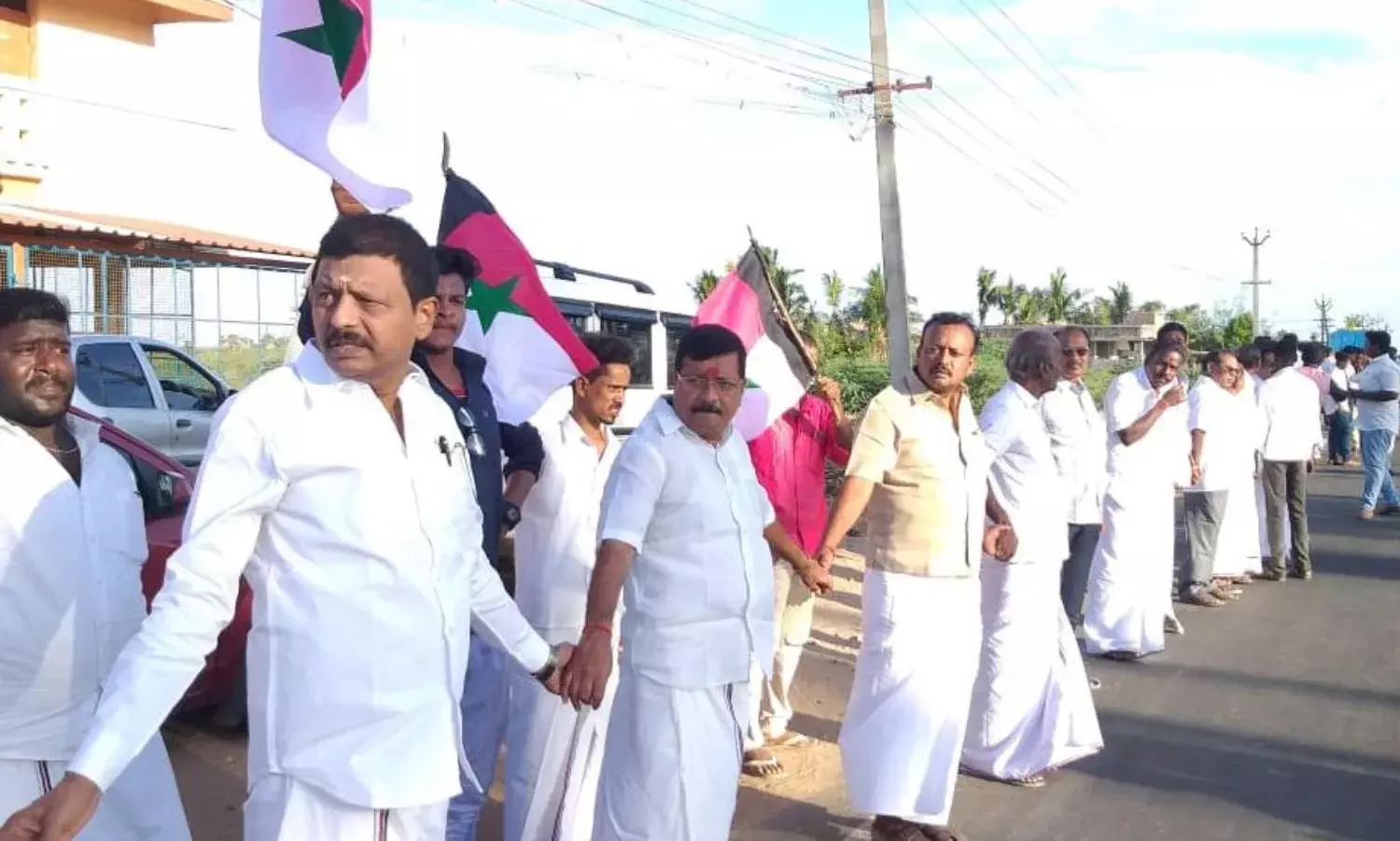Protests Resume Against ‘Disaster Projects’ in Tamil Nadu
Governments refuse to negotiate with ordinary people;

CHENNAI: Tamil Nadu has been witnessing a number of popular or civil society movements against various unsustainable development projects in recent times. The latest renewal of protests comes after the government’s granting fresh permission to ONGC and private corporations to drill more wells to extract methane, crude oil and natural gas in the Cauvery Delta or coastal districts of the state.
To confront the central government’s move, on Sunday a human chain was organised by a civil society group called Movement Against Destruction. The human chain stretched across some 600 kilometres from Marakkanam in Viluppuram district up to Rameswaram in Ramanathapuram district.
This protest gained the limelight for the massive turnout of youth, students, members of merchant associations, fishermen’s organisations, workers, farmers, fishermen and women to save cultivated agricultural lands from destruction, and to protect the livelihoods of fishermen and farmers.
Besides civil society organisations, political leaders and newly elected MPs and MLAs drawn from the Congress, DMK, MDMK, CPI, CPM, VCK, Tamil Nadu Muslim Progressive Front, Tamizhaga Vazhvurimai Katchi and other parties joined the human chain to express their solidarity and support.
Well known social activist Metha Patkar addressed a press meet before the human march and expressed her solidarity for the protest.
The march echoed ordinary people’s sentiments against various projects that are projected as bringing about development, but wreak widespread livelihood and ecological destruction.
Protesters are demanding that the central and state governments should give up their pursuit of destructive policies such as hydrocarbon projects, neutrino projects, Sagar Mala, Bharat Mala, thermal power stations and atomic power stations, the dumping of atomic waste, the eight-lane national highway project, the GAIL fuel pipeline, the Sterlite plant, the construction of high-voltage power transmission towers on agricultural lands in the state, and so on.
According to the press statement, “The human chain was organised because the newly formed central government recently gave permission to Vedanta to set up 118 drilling wells in a 1,794 sq km area from Vilupuram to Marakkanam to Puducherry, and 158 drilling wells in Karaikal and Nagapattinam, Chidambaram, Parankipettai and Pushpavanam. Permission has been granted to drill wells in 67 locations with a total area of 542 sq km in the Cuddalore circle, 332 sq km in the Nagapattinam district, and 152 sq km in near-sea areas.”
People in the Thanjavur, Thiruvarur, Pudukkottai and Nagapattinam districts in the Cauvery basin reported that the existing drill wells to extract crude oil and natural gas have already caused soil as well as groundwater contamination, leading to the destruction of agriculture and livestock, further leading to displacement of people.
K.K.R.Lenin, chairman of Movement Against Destruction told The Citizen that there was a massive turnout for the human chain. “Despite intense and sustained protests, the centre in connivance with the state government is hellbent on implementing the unsustainable, anti-developmental and anti-people projects.
“Further, the central and state governments are using coercive methods to derail the protests through intimidation and witch-hunting of activists involved in the protests, and hatching plots to threaten and terrorise the protestors with the help of police forces.
“But I am determined to carry forward the protests, despite the threat to my life and family.”
Manoj Selvaraj, who participated in the protests, is a Supreme Court lawyer and social activist. He told The Citizen that the human chain was successful because of the overwhelming support of people from all walks of life. “The centre and state should heed the voices of people on the ground instead of imposing projects on them in the name development.”
K.Ayyanathan, a journalist and social activist who helped organise the human chain protest, told The Citizen that “the loot of natural resources by the corporate nexus with political leaders should come to an end. The hydrocarbon project in the Cauvery Delta area endangers the livelihood of farmers and fishing communities.
“If the project becomes a reality, the water-starved Cauvery Delta will become a desert, resulting in the displacement of people. Despite the local people’s long-standing protest, the central and state governments are determined to begin the project under the pretext of development.”
Demands or Petitions to the State and Central Governments
. Not to grant any permission for any catastrophic projects in Tamil Nadu without the people’s consent.
. At the coming session of the Tamil Nadu Assembly on June 28, the assembly must pass a special resolution to urge the centre to declare the Cauvery Delta as a protected agricultural area, and to stop the various disaster projects including hydrocarbon.
. In the current session of Parliament, government and opposition party members from Tamil Nadu should unanimously adopt a special resolution urging the cancellation of hydrocarbon projects in Tamil Nadu and declare the Cauvery Delta area as a protected agricultural zone.

